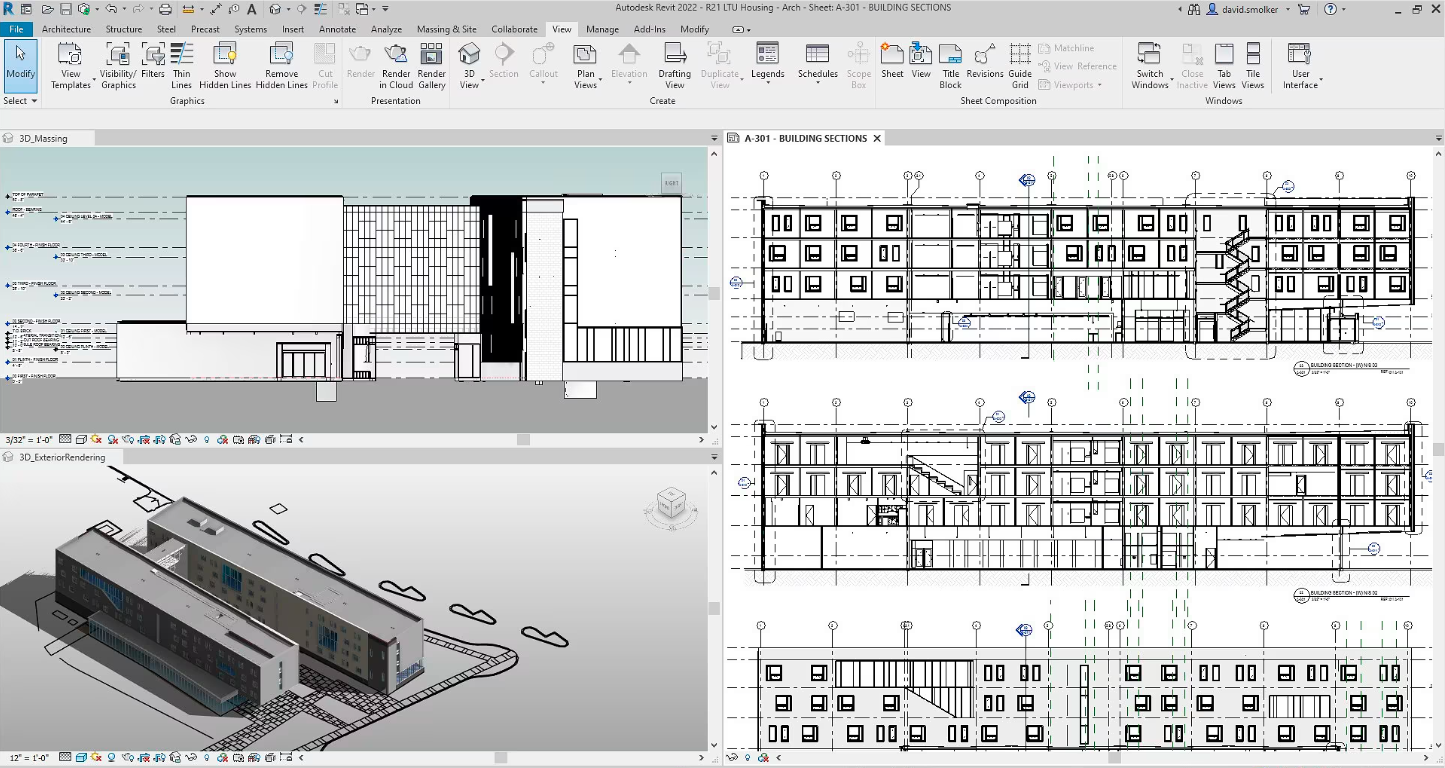9 Best Revit Diploma Courses and Online Certification Programs 2025

Table of Contents
If you are an architect or civil engineer, you must have heard of Revit.
And why not? Revit is one of the most sought-after design and construction software around the world. It is helping leading global Architecture, Engineering, and Construction (AEC) companies to design and build better. So, let’s understand what makes Revit such a favourite.
What is Revit?

Revit is a Building Information Modelling (BIM) software that aids in designing, documenting, and maintaining construction and infrastructure projects through the creation of advanced 3D models. These 3D models are very comprehensive and reflect information about a project’s structural components, utility services, energy consumption, and performance. This increases the useability of Revit across various sectors such as architecture, civil engineering, landscape designing, structural engineering, and MEP (Mechanical, Electrical, and Plumbing) consultation.
What are the Benefits of Revit for AEC Professionals?

In the past decade, Revit has emerged as one of the most efficient BIM software helping companies to deliver better results. Mentioned below are the key benefits of Revit that make it so popular across various sectors in the AEC industry.
1. Efficient Design Process
Revit offers a parametric modelling environment, meaning changes made to one part of the model will be automatically updated in other related components. This makes the process of communication and coordination more streamlined by helping avoid any room for confusion or error.
2. Improved Collaboration
AEC projects involve the interest of multiple stakeholders such as architects, engineers, clients, vendors, contractors, and developers This implies that there will be many opinions and ideas sprouting at every stage of the project. Since Revit is a cloud-based platform, it can ease real-time collaboration among various professionals, reducing the possibility of miscommunication.
3. Data-Rich 3D Models
Revit goes beyond the conventional 3D modelling software and provides a pool of information about any project. Professionals can attach data to building elements such as material quantity, specification, cost, structural components, and building performance. This makes it easier to check a project’s design for any errors and make it error-free.
4. Streamlined Documentation
Generating construction documentation is a time-consuming task. Revit automates this process, by updating floor plans, elevations, sections, and schedules as the model evolves. This helps save time spent in back-and-forth communication among various professionals.
5. Interoperability
Revit is designed to work seamlessly with other software applications commonly used in the AEC industry. It can import and export data in various formats, ensuring compatibility and efficient data exchange with other tools. These other tools offer additional computational and design capabilities, making the use of Revit easier for other use cases and industries.
Read More: Revit MEP: Benefits and Revolution of BIM Workflows
Why Must AEC Professionals Learn Revit?

Revit is an industry-relevant software that is witnessing rapid adoption in the AEC industry. But in case, you are still unsure about why you should be learning the software, here are two formidable reasons:
1. Career Growth
Learning Revit software can be a worthwhile decision for your career as the BIM industry is rapidly expanding. More and more construction companies are embracing new-age tools and technologies to streamline and speed up their processes. Since Revit is one of the most widely-used BIM software, having Revit proficiency can help you get an edge over your peers in bagging better job opportunities. Being skilled in Revit can also net you improved salary prospects because Revit-skilled professionals are in high demand in the AEC industry. A fresher Revit BIM specialist in India can earn anywhere in the range of INR 3,00,000 to INR 4,00,000 depending upon their level of skills and location.
2. Ease of Work
The most fundamental benefit of Revit is the efficiency – of time, money, and effort. Revit helps streamline workflows through interactive processes. As a professional, it allows you to establish your design ideas with clarity, aiding communication and coordination. Additionally, it assists in construction schedules, project management, and resource allocation; ensuring that your project is completed as desired. Furthermore, learning Revit makes it easier for you to collaborate with international teams and gain technical expertise on crucial design challenges. This makes you future-relevant and more employable across top global firms.
5 Best Revit Online Courses in 2025
The most time-efficient and cost-effective medium of learning Revit is through online courses. So if you are looking for Revit online courses to upskill this year, below is a list you must check out.
1. Revit And BIM Online Certification Course by Novatr
Duration: 7 months
Fee: INR 1,95,000
Certification: Yes
Placement Assistance: Yes
The BIM Professional Course for Architects by Novatr teaches learners how to operate software like Revit, along with other software like ArcGIS, RecapPro, Twinmotion, Dynamo, Navisworks and more. The Revit BIM course curriculum covers topics like setting projects using Revit, effective strategies for developing Revit families, creating parametric components using Revit, and then enhancing your knowledge with advanced subjects like information management, 3D visualisation, and adding 4D, 5D, and 6D information to previously created models. In addition to Revit, this online course teaches other BIM software used in team settings and how to follow optimum workflows. In the end, you get to put your learning to practice on a simulated ISO 19650 Certified and RIBA-framework capstone project. This exceptional course comes with triple certification to validate your expertise in the field of BIM and Revit.
2. Revit for Structural Design Exam Prep by Coursera
Duration: 23 hours
Fee: Free of cost
Certification: Yes
Placement Assistance: No
If you are looking for a cost-effective Revit online course, then this program can be a good choice for you. The course curriculum covers topics such as working with structural components, materials, and selection sets. It also discusses concepts like creating and managing views, and annotations, setting up and managing sheets, alongside working with revisions. Additionally, the curriculum also entails using workflows and processes such as work sharing, phasing, design options, and project management. This Revit course is backed by quizzes and assignments to ensure that participants have a fulfilling learning experience.
3. The Complete Beginner’s Guide to Autodesk Revit Architecture by BIMscape
Duration: 19 hours
Fee: Free of cost
Certification: No
Placement Assistance: No
Available on YouTube for free, this Revit online course by BIMscape is a great choice for people who want to understand the fundamentals of Revit. This comprehensive Revit course teaches its participants about the basics of parametric modelling, structural massing, creating walls and openings, and working with families, and cameras. It will also cover the topics of lighting, tags, phases, sheet layouts, and printing. The course is broken down into 81 short videos for easy understanding of concepts.
Read More: Online vs Diploma- Which Medium is Best for Learning Revit?
4. Autodesk Revit – Beginner to an Intermediate Level by Udemy
Duration: 8 hours
Fee: INR 3,099
Certification: Yes
Placement Assistance: No
This paid Revit online course by Udemy provides holistic knowledge about the software for beginners. It is a short Revit course – full of quizzes and assignments to provide participants with an engaging learning experience. Learners can even download the course videos along with other resources and view them in their free time. The course curriculum incorporates fundamentals of BIM, insights on the wireframe of Revit, 3D modelling tools, components, and datum elements. The course is ideal for participation by architects, engineers, and contractors.
5. Autodesk Revit Architecture Masterclass: A Complete Guide for Beginners by Skillshare
Duration: 3 hours
Fee: Free for 1 month
Certification: Yes
Placement Assistance: No
Offered by Skillshare, this on-demand Revit course is a good choice for people who want to grasp the basics of Revit within a restricted time frame. The course covers Revit fundamentals such as setting units and views, importing CAD files, modelling walls, mirror tools, importing furniture, and generating element schedules. Participants can ask questions, exchange feedback, and learn alongside other students virtually.
6. Revit 2023: Professional Revit Course by Udemy
Duration: 20 hours
Fee: INR 2799
Certification: Yes
Placement Assistance: No
This Revit online course provides a deep dive into the realm of BIM for creating precise and efficient 3D models. The course curriculum encompasses the topics of drafting floor plans, elevations, and sections. Participants can immerse themselves in a hands-on project to acquire real-world knowledge about the applications of Revit. The course is meant for people who want to have a deeper understanding of BIM workflows for managing and coordinating projects. This program is best suited for participation by architects, civil engineers, and interior designers.
3 Best Offline Revit Diploma Courses 2025

If learning Revit the traditional way is on your upskilling checklist, take note of these 3 offline Revit diploma courses that you can enrol for.
1. Revit Architecture SMEClabs
Duration: 1 month
Fee: INR 62,500
Certification: Yes
Placement Assistance: Yes
This Revit diploma program is offered by SMEClabs in association with the National Skill Development Corporation. It is a comprehensive course tailored for learners who wish to make a career in architectural designing and Revit modelling. The course curriculum encompasses topics such as creating walls, stairs, ramps, railing, openings, structural massing, materiality, lights, cameras, and rendering. It also teaches about dimensioning in Revit, family creation, site design, and walkthrough development. The course is backed by project-based learning so that participants can learn the industry applications of BIM in real-time.
2. Revit Course by 4Achievers
Duration: 3 months
Fee: INR 19,500
Certification: Yes
Placement Assistance: Yes
Revit course by 4Achievers is one of the most budget-friendly and well-structured offline Revit diploma courses. It is taught by industry experts and offers insights into the real-world useability of Revit through case studies and project-based learnings. The course curriculum includes topics such as fundamental BIM principles, 3D modelling in parametric environments, Revit tools and commands, drawing layouts, and creating and editing building models. This is a cohort-based course, so learners get the opportunity to interact with their peers, share their knowledge, and grow as a community.
3. Revit Architecture Training & Certification Course by CADD Centre
Duration: Self-paced
Fee: Available on enquiry
Certification: Yes
Placement Assistance: Yes
CADD Centre has one of the widest technology upskilling academic setups in India offering software expertise through industry experts. Their Revit Architecture Training Course is suitable for designers, structural and MEP engineers, and contractors. The course curriculum provides in-depth knowledge about parametric 3D modelling components, scheduling, annotation, and streamlining workflows. Participants can complete the course at their own speed and explore the opportunity of working on real-time projects.
In Conclusion
Learning Revit can be one of the most rewarding investments for your career as an AEC professional. We would recommend you not just limit your learning to Revit but expand your knowledge by enrolling in BIM courses. This will help you learn various software and processes, making you a more demanding resource in the field. Similar to Revit, you can look for BIM courses both offline and online. You can make a decision based on your learning preferences, budget, and professional goals.
If you are looking for a trustworthy online platform to learn BIM, we recommend you check out the BIM courses by Novatr. They offer two comprehensive globally competent courses on BIM, one each specifically catered for architects and civil engineers respectively. You can explore more about the individual courses by following the links below.
Check out the courses today!
- BIM Professional Course for Architects
- BIM Professional Course for Civil Engineers

 Thanks for connecting!
Thanks for connecting!


.png)


